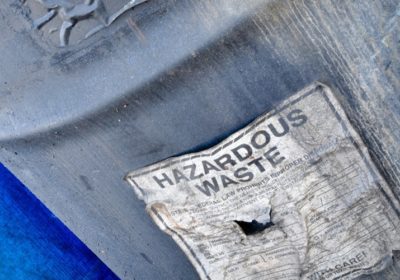RJS Waste Management UK has the experience to help plan all aspects of your hazardous waste management strategy. We will use our technical know-how to meet the challenges of the latest hazardous waste regulations, waste disposal regulations and other legislative demands.
What is hazardous waste?
As reported by the Health and Safety Executive (HSE), The Environment Agency (EA) defines hazardous waste as that which contains substances or has properties that might be harmful to human health or to the environment. This may be immediate or over an extended period. Examples of hazardous waste include:
- Asbestos
- Chemicals, like paint or brake fluid

- Batteries
- Solvents
- Pesticides
- Non-edible oils like car oil
- WEEE containing ozone-depleting substances, like fridges
- Hazardous waste containers
- Grade D wood waste
Hazardous waste regulations
In April 2011, The Waste (England and Wales) Regulations 2011 brought major changes to hazardous waste management.
Only those with an appropriate permit may mix hazardous waste and they must comply with the Best Available Techniques (BATs) from the EA and the Department for Environment, Food & Rural Affairs (Defra).
A “sensitising” hazardous property was introduced and the requirements for record-keeping were updated. Hazardous waste consignment notes were amended and procedures for multiple consignments were simplified.
As of September 2023, under advisement from the Wood Recyclers’ Association (WRA), the EA withdrew its Regulatory Position Statement (RPS) 250. Ten types of wood waste from buildings constructed before 2007 are classified as hazardous waste. Wood waste recyclers will not accept potentially hazardous wood waste unless it is tested and proven safe.
Our hazardous waste management process
After performing an audit of your site, we will provide the best options for hazardous waste disposal. We can offer a complete package for the identification, collection and treatment of all hazardous wastes and “difficult” non-hazardous waste in bulk, whether they are stored in drums or tanks.
For your peace of mind, our processes will ensure the supply of a completed hazardous waste consignment note, waste transfer note and data destruction certificate (as necessary).

